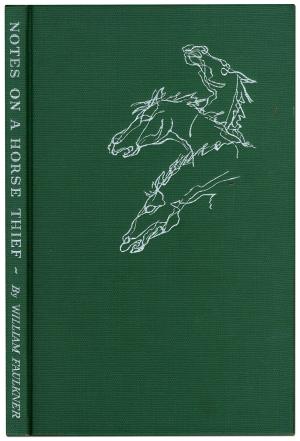Compiled By Nancy Brannon
I regularly get emails from Square Books in Oxford, Mississippi giving me titles and information about the latest books and guest authors. During December, I also received “The Daily Dozen” with gift ideas from the bookstore. One of the rare books that was featured in mid-December was a William Faulkner signed, limited edition copy of Notes on a Horse Thief. It’s a classic that I thought was worth writing about. This edition of Notes on a Horse Thief is valued at $1,200.
“Notes on a Horse Thief was printed on November 4, 1950 by the Levee Press of Greenville, Mississippi, the same year Faulkner received his Nobel Prize in Literature, which was actually awarded in 1949. The Prize was awarded to Faulkner “for his powerful and artistically unique contribution to the modern American novel.”
This book/novella is a postscript to his 1948 novel, Intruder in the Dust, a novel about racial injustice and the larger role of race relations in a small town in Mississippi in the 1940s. Notes on a Horse Thief was later revised and incorporated into A Fable (1954), which won the Pulitzer Prize and the National Book Award. A Fable takes place in France during World War I and stretches through the course of one week in 1918.
Notes on a Horse Thief is set in April 1914 when a famous racehorse has his leg irreparably injured in a train wreck. His English groom takes advantage of the situation and steals the horse, with the aid of an itinerant black preacher/stableman and his grandson. The three nurse and care for the horse and bring him back to health sufficiently to be raced – and win – at small tracks in out-of-the-way county seats and country fairs throughout the south. They are constantly eluding the pursuing detectives, police, insurance adjusters, and others eager for his apprehension.
The chase ends in a small Missouri town, where the escape of the English groom is effectuated as a tribute from the community to the groom’s efforts to have the horse serve his natural purpose – racing – instead of imprisoning him in a stable, retired at stud. The community also saves the black preacher/stable worker from the law as a reward for his role in the escapades, thus reversing the basic situation in Intruder in the Dust.
I regularly get emails from Square Books in Oxford, Mississippi giving me titles and information about the latest books and guest authors. During December, I also received “The Daily Dozen” with gift ideas from the bookstore. One of the rare books that was featured in mid-December was a William Faulkner signed, limited edition copy of Notes on a Horse Thief. It’s a classic that I thought was worth writing about. This edition of Notes on a Horse Thief is valued at $1,200.
“Notes on a Horse Thief was printed on November 4, 1950 by the Levee Press of Greenville, Mississippi, the same year Faulkner received his Nobel Prize in Literature, which was actually awarded in 1949. The Prize was awarded to Faulkner “for his powerful and artistically unique contribution to the modern American novel.”
This book/novella is a postscript to his 1948 novel, Intruder in the Dust, a novel about racial injustice and the larger role of race relations in a small town in Mississippi in the 1940s. Notes on a Horse Thief was later revised and incorporated into A Fable (1954), which won the Pulitzer Prize and the National Book Award. A Fable takes place in France during World War I and stretches through the course of one week in 1918.
Notes on a Horse Thief is set in April 1914 when a famous racehorse has his leg irreparably injured in a train wreck. His English groom takes advantage of the situation and steals the horse, with the aid of an itinerant black preacher/stableman and his grandson. The three nurse and care for the horse and bring him back to health sufficiently to be raced – and win – at small tracks in out-of-the-way county seats and country fairs throughout the south. They are constantly eluding the pursuing detectives, police, insurance adjusters, and others eager for his apprehension.
The chase ends in a small Missouri town, where the escape of the English groom is effectuated as a tribute from the community to the groom’s efforts to have the horse serve his natural purpose – racing – instead of imprisoning him in a stable, retired at stud. The community also saves the black preacher/stable worker from the law as a reward for his role in the escapades, thus reversing the basic situation in Intruder in the Dust.








